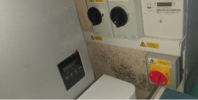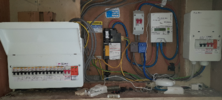It doesn't for original Joe Soaps, so that's not strictly true. The OP should only be advised to use the main switch.... except that, as you know, BS7671 says that single-pole isolation is OK with TN supplies.
Their argument for saying that (which they mention) seems reasonable for TN-C-S (since N & MET/CPCs are then joined within the installation), but I'm not so sure about TN-S
You are using an out of date browser. It may not display this or other websites correctly.
You should upgrade or use an alternative browser.
You should upgrade or use an alternative browser.
Solve an argument: Should you turn ALL of the main switches off when working on electrics.
- Thread starter reoreborn
- Start date
Sponsored Links
It doesn't for original Joe Soaps, so that's not strictly true. The OP should only be advised to use the main switch.
Hit, nail and head springs to mind
Lock off Breaker (or put fuse in pocket) and disconnect N for that circuit (after testing for Live then Dead)
- Joined
- 27 Jan 2008
- Messages
- 25,361
- Reaction score
- 2,981
- Location
- Llanfair Caereinion, Nr Welshpool
- Country

We do tend to consider our one homes.

 So I have 7 isolators, one built into the inverter first picture on left. Most of house isolated with the one in consumer unit to left second picture, 4 sockets and 1 FCU with the isolator under the inverter.
So I have 7 isolators, one built into the inverter first picture on left. Most of house isolated with the one in consumer unit to left second picture, 4 sockets and 1 FCU with the isolator under the inverter.
To go turning off isolators rather than the RCBO could easy mean you have not turned off the required circuit. The important thing is to test for dead.

 So I have 7 isolators, one built into the inverter first picture on left. Most of house isolated with the one in consumer unit to left second picture, 4 sockets and 1 FCU with the isolator under the inverter.
So I have 7 isolators, one built into the inverter first picture on left. Most of house isolated with the one in consumer unit to left second picture, 4 sockets and 1 FCU with the isolator under the inverter.To go turning off isolators rather than the RCBO could easy mean you have not turned off the required circuit. The important thing is to test for dead.
Sponsored Links
Yep - or, of course, in a non-domestic situation, quite possibly from one of multiple 'supplies', perhaps even including a local generator.or from a UPS or SPS
I'm sure it's incredibly rare.I have come across this situation once as far as I recall in my working lifetime.
I'm also sure that's true, so .....Whereas installations where RP has been present were far more common.
... certainly is theoretically good advice.DP isolation is certainly safer in a DIY situation where the correct testing for dead procedure is less likely.
As always, it's all probabilistic, so comes down to varying attitudes to 'risk-taking' vs. 'risk-averse' Even for a DIYer (and even foer someone who dose not 'test for dead') the probability of coming to harm with just SP isolation is extremely small - but, of course, not zero.
Can you explain that ?It doesn't for original Joe Soaps, so that's not strictly true.
That is certainly pretty close to 'totally foolproof', so no-one could disagree with that advice. However, I wonder how many DIYers (or even electricians) actually do it ? Do you?The OP should only be advised to use the main switch.
The thing is, it's no longer a non-domestic thing given the prevalence of solar systems with battery storage, and EVs with V2G facility. And some of these include the ability to operate off-grid like a UPS.Yep - or, of course, in a non-domestic situation, quite possibly from one of multiple 'supplies', perhaps even including a local generator.
A schoolmate went on to be an ekectrician and got very badly burned on an industrial site. Power was switched off, system tested for dead, my schoolfriend was cleared to start work (in a busbar chamber I think), and when he touched the busbars they were live because the genny had started up.
His injuries (especially internal) were such that he wasn't expected to survive. I don't know him that well, but friends who do tell me his character/temperament changed dramatically.
Very true - which underlines my/the point that, even in a domestic setting, 'testing for dead' remains the crucial thing, regardless of what one has 'switched off'(or thinks one has switched off).The thing is, it's no longer a non-domestic thing given the prevalence of solar systems with battery storage, and EVs with V2G facility. And some of these include the ability to operate off-grid like a UPS.
Agreed, you can not be too careful out there folks, in recent years the risks have become far greater too, just how this situation has been described is one example.
You only need one Electric Shock to become Electrocution. You only need one Electric Shock to cause sudden involuntary movement, up a ladder, on a scaffold, close to an unfenced floor etc etc etc.
You only die once, leave it to the longest possible date from now.
You only need one Electric Shock to become Electrocution. You only need one Electric Shock to cause sudden involuntary movement, up a ladder, on a scaffold, close to an unfenced floor etc etc etc.
You only die once, leave it to the longest possible date from now.
That was supposed to read as "ordinary Joe Soaps" - not "original".It doesn't for original Joe Soaps, so that's not strictly true. The OP should only be advised to use the main switch.
I guessed that much, but still didn't (and don't) understand what you were actually trying to say - what "doesn't" for ordinary Joe Soaps?That was supposed to read as "ordinary Joe Soaps" - not "original".
I wonder too, it might be a kind of "You do not need to drive with due care and diligenc unless you are a member of the Institute of Advanced Motorists" or somesuch kind of statement , or then agin it might not, I am not sure.
I find it's good practise in any situation to reduce the load using the mcbs prior to operating any main switch and reverse this process when switching back on.Sorry, in no way am I being critical, but if you turn off the main switch, why turn off the MCB as well?
Not saying its always necessary to isolate the supply via the main switch, the important thing is that safe isolation and test for dead is carried out
turning the main breaker off is belt and braces.Sorry. A bit of an odd one.
Last night I was replacing plug sockets upstairs of a relatives house. On the main board I switched off the upstairs sockets (as labeled on the board), went upstairs and checked to make sure there was no electric to the plugs. I didn't lock off the board as it was only me and a relative in the house.
During this a neighbour came around for a cup of tea with my relative. When he found that I'd only turned off one switch he came bounding up the stairs moaning that what I was doing was dangerous. I asked why and he said "When working on electrics you turn ALL the switches off AND the main switch". He's a rather odd bloke and was going a bit off the rail. so I went along with his request and turned them all off to calm him down.
I am an amateur but I am able to replace plug sockets and have done it for over 25 years. This morning he sent me a screenshot of a website (a dodgy forum) that confirmed what he'd said.
Who is in the right/wrong on this one? I am 99% sure my way is the correct way but as I say I'm an amateur..
Ring mains can be broken which can cause confusion….and the ends of rings can be connected to different MCBs
There are loads of potential faults conditions.
Personally I’d say turning off all the sockets and leaving the light circuits on can be fairly safe…..so you can work with lights on.
DIYnot Local
Staff member
If you need to find a tradesperson to get your job done, please try our local search below, or if you are doing it yourself you can find suppliers local to you.
Select the supplier or trade you require, enter your location to begin your search.
Please select a service and enter a location to continue...
Are you a trade or supplier? You can create your listing free at DIYnot Local
Sponsored Links
Similar threads
- Replies
- 9
- Views
- 2K
